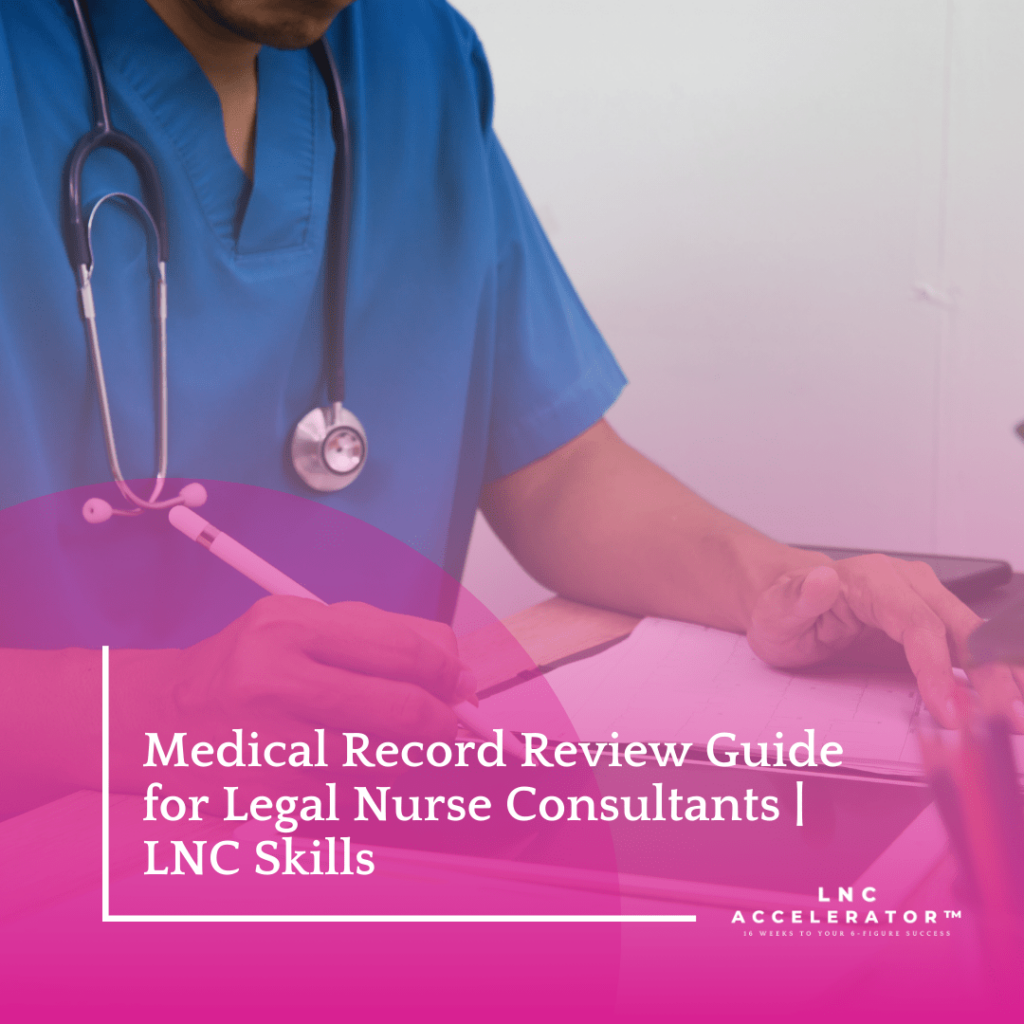
Medical Record Review Guide for Legal Nurse Consultants | LNC Skills
Foundations of Review
The art of medical record review lies at the heart of legal nurse consulting. While you’ve reviewed countless charts during your nursing career, analyzing records for legal purposes requires a slightly different approach. Let’s explore how to master this essential skill.
The Foundation: Understanding Legal Purpose
Medical record review for legal cases differs from clinical review in several important ways. When reviewing charts for patient care, you focus on current status and treatment plans. In legal review, you’re often looking backward, analyzing the entire course of care to understand what happened and why.
Starting with Structure
Begin each review by understanding the record’s organization. Modern medical records often come from multiple sources and may not be chronologically arranged. Take time to understand the filing system, identify missing sections, and note any duplicates.
Think of it as creating a map of the medical record. Just as you wouldn’t start a road trip without understanding your route, you shouldn’t dive into detailed review without knowing how the record is structured.
Creating a Strategic Approach
Develop a systematic method for your review. Some legal nurse consultants prefer starting with admission and discharge summaries to grasp the big picture. Others begin with nursing notes to understand the day-to-day progression. Whatever method you choose, consistency helps ensure thorough analysis.
Analysis Process
The Timeline: Your Critical Tool
Creating a detailed timeline serves as the backbone of your analysis. Note not just what happened, but what should have happened according to standard practice. Your nursing experience proves invaluable here – you understand the expected progression of care and can identify deviations.
Focus on Key Documentation Points
Pay particular attention to transitions of care, changes in patient condition, and responses to complications. These crucial moments often reveal the most important information about the quality of care provided.
Remember those times when you’ve witnessed condition changes during your nursing shifts? That experience helps you recognize when documentation doesn’t reflect appropriate assessment or intervention.
Reading Between the Lines
Your clinical experience helps you identify what’s missing from the record. Perhaps vital signs weren’t recorded as frequently as they should have been, or assessments lack important details. These gaps can be as significant as what’s actually documented.
Professional Methods
Understanding Different Perspectives
Each member of the healthcare team documents from their perspective. Physicians focus on diagnosis and treatment plans. Nurses detail ongoing assessments and interventions. Therapists concentrate on functional improvements. Understanding these different viewpoints helps you piece together the complete picture.
The Importance of Chronological Order
While you may review records in various ways, creating a chronological reconstruction helps identify cause-and-effect relationships. This becomes particularly important when analyzing how healthcare providers responded to changes in patient condition.
Documenting Your Findings
Clear, objective documentation of your findings is crucial. Focus on facts rather than assumptions. Instead of writing “the nurse should have,” document what the records show compared to established standards of care.
Technology and Tools
Modern medical record review often involves electronic records and specialized software. While technology can streamline the process, your clinical understanding remains the most important tool. Use technology to organize information, but rely on your expertise for analysis.
Common Pitfalls to Avoid
Don’t get lost in irrelevant details. Focus on information pertinent to the legal issues at hand. Maintain objectivity and avoid making assumptions about care providers’ intentions. Remember, your role is to analyze, not judge.
Handling Missing Information
Medical records aren’t always complete. When you encounter missing information, document these gaps clearly. Consider how missing information might affect your analysis and whether additional records might be needed.
Building Your Medical Review Expertise
Each case you review builds your expertise. Pay attention to patterns in documentation, common issues that arise, and effective ways to organize complex information. Your skills will grow with each review you complete.
The Power of Experience
Remember that your nursing background gives you unique insights into medical record review. You understand workflow patterns, standard practices, and the realities of healthcare delivery. This knowledge helps you analyze records more effectively than someone without clinical experience.
Communication with Legal Teams
Learn to communicate your findings clearly to legal professionals. Avoid medical jargon when possible, and be prepared to explain clinical concepts in understandable terms. Your ability to bridge the gap between medical and legal understanding is invaluable.
Looking Forward
As you develop your medical record review skills, you’ll find patterns emerging. Each case teaches you something new about analysis techniques, documentation standards, and effective communication of findings.
Your role in medical record review is crucial to the legal process. Your nursing experience, combined with developed review skills, helps ensure accurate analysis of healthcare documentation.
Become a Legal Nurse Consultant
6 Figure Income Projection + Cases & Clients in 16 Weeks or Less...
(Or We’ll Work With You 1-On-1 For Free Until You Do)




